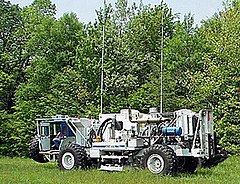Jan. 19 webinar to look at seismic testing with Marcellus gas play
live.psu.edu/story/57147#nw69
Thursday, January 12, 2012
UNIVERSITY PARK, Pa. — A Web-based seminar sponsored by Penn State Extension will examine seismic testing associated with Marcellus gas development in Pennsylvania.
Titled “Seismic Testing: What’s It All About?”, the 75-minute webinar will begin at 1 p.m. on Jan. 19. Presenters will be Kenneth Hall, of Kenneth Hall Consulting Services of Snow Shoe, Pa., and Dennis Langlois, of Houston, Appalachian region sales and marketing manager for CGG Veritas.
Hall is a retired financial adviser who has been involved in natural-gas leasing and investment for more than 15 years. He manages more than 30,000 acres of gas rights in northern Centre County and has negotiated gas leases on more than 40,000 acres.
Langlois has been in the seismic business for 32 years, the past 24 years with CGG Veritas Land Surveys. He started working on field crews in an entry-level position and worked his way up to his current job.
During the Jan. 19 webinar, Hall will discuss the potential problems that may be encountered with seismic testing and conditions property owners should require prior to approving the testing.
“Attaching conditions to the approval will minimize any potential conflicts,” he said, noting that he has been assisting property owners and mineral owners with their conflicts for many years.
“I have seen seismic testing from all sides: surface owners who do not own their mineral rights, leaseholders, gas companies and seismic companies. My experience with the potential conflicts of each party gives me unique insight into seismic-testing issues.”
Langlois will offer a slide presentation, giving a brief summary of events that take place in acquiring a 3-D seismic survey, from the initial contact with the landowners until his company has acquired the data and left the area.
“The slide presentation will show maps with surface abstracts and the recording grid needed to image the subsurface,” he said. “There also will be pictures showing the different operations and the equipment that will be used to acquire this data.”
Langlois hopes webinar participants will ask questions about the process because he is hoping to dispel misconceptions and clarify misinformation about seismic-testing operations.
The webinar is part of a monthly series of online workshops addressing opportunities and challenges related to the state’s Marcellus Shale gas boom. Information about how to register for the session is available on the webinar page of Penn State Extension’s natural-gas website.
< http://extension.psu.edu/naturalgas/webinars >
Future webinars will focus on transportation patterns and impacts from Marcellus development, and municipalities’ roles related to water use and protection.
Previous webinars, publications and information also are available on the Penn State Extension natural-gas website, < http://extension.psu.edu/naturalgas > covering topics such as air pollution from gas development; the gas boom’s effect on landfills; water use and quality; zoning; gas-leasing considerations for landowners; implications for local communities; gas pipelines and right-of-way issues; legal issues surrounding gas development; and the impact of Marcellus gas development on forestland.
For more information, contact John Turack, extension educator based in Westmoreland County, at 724-837-1402 or by email at jdt15@psu.edu.

